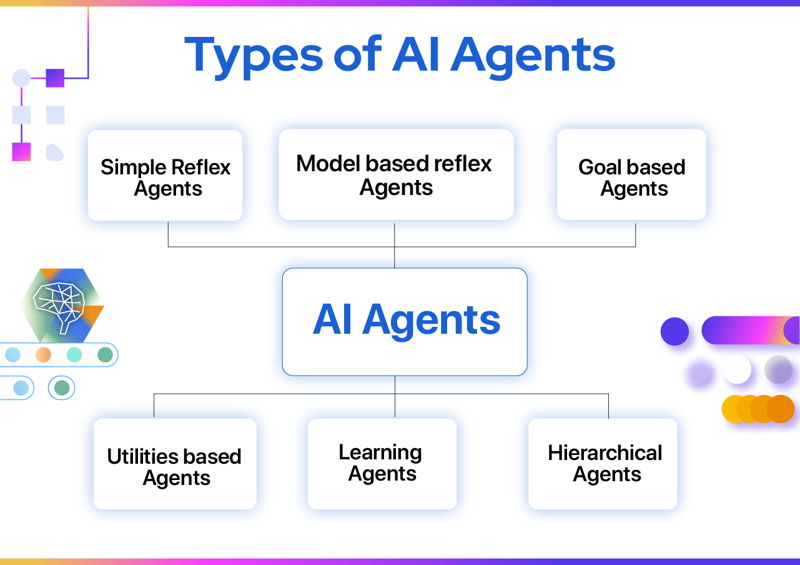The Future of AI Agents: Redefining Work, Creativity, and Human Collaboration
Picture this: you stroll into a shop, and someone greets you, maybe even asks about your favorite color, then helps you track down what you need. That’s the sort of experience AI agents aim to replicate. These digital helpers are changing the way we deal with technology sometimes quietly, sometimes in ways you can’t help but notice. This article takes a wander through the world of AI agents: what they can do, where they’re already at work, and where things might be headed.
From chatbots that answer questions at odd hours to cars that find their own way through rush hour traffic, AI agents are showing up everywhere. But what really makes an AI agent tick? And why are they suddenly so important? Let us dig a little deeper.
Table of Contents
What Are AI Agents?
Core Features of AI Agents
What sets AI agents apart? For starters, they do not wait around for instructions. They take in what is happening around them and act on it just like a mouse figuring out a maze. These agents can watch, react, and learn as they go, which makes them surprisingly resourceful. Picture a simple digital “rat” that learns to avoid dead ends over time, finding the cheese a little faster each run.
With these traits, AI agents tackle jobs that would boggle any human left to do it by hand. They sift through piles of data, spot patterns, and guess what happens next. That’s why you’ll find them in places like hospitals, banks, and traffic systems. And if their learning keeps improving, who knows what they’ll handle next?
Suggested Reading: Introduction to AI Agents
Types of AI Agents
Turns out, not all AI agents think the same way. Some, called simple reflex agents, just react to what’s in front of them if this, then that. Others, known as model based agents, keep an inner “map” to help decide what to do next. Then there are goal based agents: these don’t just react, they aim for a specific outcome and shift their approach to get there. Take a building manager agent, for example: it’ll watch energy use, tweak the AC, and adjust lights, all to keep bills down and comfort up.
Each flavor of AI agent brings its own strengths and gaps. Some are lightning fast but not too bright, others can plan ahead but need loads of data. As technology evolves, expect new blends to pop up, learning and interacting in ways we haven’t seen yet.

How AI Agents Work
Learning and Adaptation
AI agents aren’t born smart they learn. When they try something and get feedback, they adjust. Machine learning gives them this knack for spotting patterns, making guesses, and changing tack if things go sideways. Remember the chess bots that used to get crushed by grand masters? Now, after enough practice, they barely break a sweat.
This ability to learn is what makes them so handy. Over time, they get better at jobs like understanding language, picking out faces in photos, or sorting through loads of information. It’s a work in progress, though sometimes they hit a wall. Still, you get the point.
Interaction with Environments
AI agents reach out to the world using sensors and actuators. Sensors help them “see” or “hear” things, while actuators move or act. The two work together: an autonomous car scans its surroundings and then steers or brakes. Feedback is constant, if something changes, so do their actions.
This back and forth with the environment is critical. It’s how robots learn to walk, how smart speakers catch your commands, and how self driving cars (usually) avoid potholes. They still struggle sometimes, but as these systems get better, so will their instincts about the world.
Scale Your Content Effortlessly
Automated article generation for unstoppable SEO growth. Wordze helps you publish faster, smarter, and more often.
Current Applications of AI Agents
Business and Customer Service
Plenty of companies now rely on AI agents for customer support those chat bubbles that pop up when you’re about to give up on a website? Often not a person behind the curtain. These agents answer basic questions day and night, keep queues moving, and even handle simple fixes. In the backend, businesses use them to manage stock, plan deliveries, or sort complaints. Amazon, to name just one, depends on AI for all sorts of behind the scenes magic, from tracking packages to helping customers find lost orders.
Healthcare’s another big one. Here, AI agents dig through test results, compare images, and sometimes spot trouble before a doctor does. Imagine an AI that flags a shadow in a scan a blip the human eye might miss. That could mean catching a disease before it gets out of hand. Not bad for a “virtual” assistant.
Suggested Reading: Top AI Agent Platforms
Healthcare and Research
In research, AI agents trawl through mountains of data genetic codes, test results, medical histories searching for patterns or links people might overlook. Sometimes they come up with clues that lead to new drugs or a better understanding of how a disease spreads. It’s not just about the science, either. These agents now help patients stick to treatment plans, offer reminders, deliver tailored health tips, and give support that feels surprisingly personal for a software bot.
Imagine you get a nudge on your phone reminding you to take your pills, along with gentle encouragement. It’s not quite a nurse by your side, but it’s a helping hand just the same.
Benefits and Limitations of AI Agents
AI agents come with a long list of perks: they process info quickly, work round the clock, and rarely forget a thing. They spot trends, make predictions, and tackle repeat work, leaving people free for trickier tasks. But they’re not perfect. Along with the pluses come some pretty knotty issues think privacy worries, hacking risks, and the odd technical failure.
One of their biggest strengths is taking over boring, repetitive jobs. That’s why you see them running chat windows, scheduling deliveries, or checking paperwork. People can then focus on trickier problems at least, that’s the idea. AI agents are efficient, but they’re still a work in progress.
Key Challenges Facing AI Agents
Ethical and Security Concerns
It’s easy to get excited about what AI agents can do, but they do raise some tough questions. Sometimes they copy the biases buried in their training data. Other times, their decisions are so opaque, nobody can explain why they did what they did. Picture an AI screening job candidates: if its training was flawed, it might quietly sideline entire groups and no one would be the wiser.
Then there’s security. If a hacker gets hold of an AI agent controlling sensitive gear power grids, hospital machines, or even city traffic things could get messy fast. Malicious use is a real threat, and the stakes can be sky high.
Technical Obstacles
AI agents often stumble over technical hurdles too. Feed them poor quality training data, and they’ll make poor choices. They’re easily confused by situations they haven’t seen before. Sometimes, they just don’t have the common sense a five year old might show. For example: an object recognition agent can spot a dog in hundreds of photos, but show it a cartoon dog or a weird angle, and it might freeze up.
Researchers are chipping away at these problems designing more robust, transparent models and pushing for clearer rules and standards. Progress is steady, if slow. The goal: AI agents that not only work well, but can also explain themselves when something goes sideways.
Recent Breakthroughs in AI Agents
Lately, AI agents have stepped up their game. They are getting sharper at understanding human language, seeing patterns in images, and making decisions that almost seem thoughtful. Take the case of computer programs that play games: some now rival or even beat the world’s best players after thousands of rounds and endless tweaks to their strategies.
What does this mean? Tasks once thought strictly human territory like diagnosing diseases or driving in traffic are now up for grabs. As AI agents get smarter, expect them to pop up in more industries, changing how things are done and, in some ways, how we live.
AI Agents in Everyday Life
Look around, and you’ll probably spot an AI agent at work without even realizing it. Your phone’s assistant setting reminders, your car warning you to brake, or your fridge suggesting a shopping list these little touches add up. Sometimes they save time, sometimes they just make things more fun. And they’re not done yet.
Expect more as they get smarter from AI tutors in classrooms to bots that help manage your health or pick the next binge worthy show. Will it all be perfect? Not quite. But it’ll keep getting closer.
- Siri and Alexa handling your appointments, reminders, and the odd knock knock joke.
- Cars that practically drive themselves, at least until the weather gets weird.
- That moment when your lights, thermostat, or security system seem to “just know” what you want.
- Customer support bots that answer basic questions sometimes well, sometimes with the patience of a saint.
- In healthcare, AI agents helping radiologists scan images or recommending treatment tweaks no human would catch at first glance.
AI Agents and Human Collaboration
Here’s the thing… AI agents aren’t here to push us out of the way. They’re meant to work with us filling gaps, spotting what we miss, and nudging us toward better choices. Imagine a finance pro who leans on an AI to catch market patterns faster, or a doctor using AI to double check a tricky diagnosis. The result? Smarter, faster decisions (most of the time).
This teamwork could change the game in lots of fields. Doctors and AI agents together might find better treatments. Teachers and bots could help every student learn at their own pace. The more these digital partners improve, the more they’ll help with complex thinking, creative projects, and, well, stuff we haven’t even dreamed up yet.

The Road Ahead for AI Agents
What comes next? Nobody knows for sure. AI agents are growing up fast, and their skills in language, vision, and problem solving just keep climbing. They’ll probably show up in places we haven’t even imagined yet.
More of our lives will mix with AI managing health, overseeing money, even helping us navigate traffic jams. But those thorny issues, the ethics and security and technical headaches? They won’t solve themselves. The road’s wide open, but it’s not all smooth pavement.
AI is the new electricity. It has the potential to transform every industry and make our lives easier, more convenient, and more enjoyable.
Andrew Ng
Conclusion
Here’s the bottom line… AI agents are reshaping how we use technology every day, even if we don’t always notice. From chatbots answering midnight questions to cars weaving through traffic, they’re fast becoming a fixture in modern life.
As these agents get smarter, fields like healthcare, finance, and travel will all look different. Not everything’s rosy there are tough questions about privacy, fairness, and reliability. But the future for AI agents? It’s wide open, and it’s up to us to steer things in a direction that benefits everyone. Anyway, there’s still plenty of story left to write.


